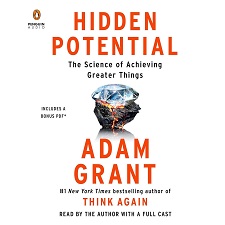“Hidden Potential: The Science of Achieving Greater Things” by Adam Grant, Maurice Ashley, et al., is a profound exploration into the dynamics of personal and collective growth. This book offers a roadmap for maximizing one’s potential, challenging the conventional notion that talent is innate and fixed. Here are 15 key lessons from the book.

Read: Feel-Good Productivity – 10 Key Lessons
1. Potential is Developable
One of the foundational lessons from “Hidden Potential” is that potential is not a static trait but something that can be developed through sustained effort, learning, and perseverance. Adam Grant and Maurice Ashley emphasize that with the right strategies and mindset, anyone can enhance their abilities and achieve more than they initially believed possible.
2. Embrace a Growth Mindset
Adopting a growth mindset is crucial for unlocking potential. This mindset, popularized by psychologist Carol Dweck, involves seeing abilities as improvable through hard work and dedication. The authors’ insights build on this concept, showing how a growth mindset can lead to greater achievements and personal growth.
3. Character Skills Matter – The Science of Achieving Greater Things
The book highlights the importance of character skills such as grit, curiosity, and emotional intelligence. These traits often play a more significant role in success than cognitive abilities alone. The authors argue that developing these character skills is essential for overcoming obstacles and achieving long-term goals (SuperSummary).
4. The Power of Deliberate Practice
The authors provide practical advice on how to incorporate deliberate practice into your routine to maximize skill development. Deliberate practice is a key component of mastering any skill. Unlike regular practice, deliberate practice involves focused, goal-oriented, and repetitive actions designed to improve specific aspects of performance.
5. Constructive Feedback – The Science of Achieving Greater Things
Seeking and utilizing feedback is crucial for personal growth. Constructive feedback helps identify areas for improvement and offers guidance on how to refine your skills. In the book, The authors emphasize the importance of creating feedback loops in both personal and professional settings.
6. Supportive Environment
A supportive environment, including mentors, coaches, and positive peers, significantly impacts your ability to achieve your goals. Grant discusses various programs that have successfully nurtured talent in disadvantaged communities, underscoring the transformative power of a supportive network.
7. Overcoming Fear of Failure
Fear of failure can inhibit potential. Grant explores the importance of psychological safety, where individuals feel secure to take risks and make mistakes. This environment fosters resilience and a healthier relationship with failure, promoting continuous improvement.
8. Creating Opportunities – The Science of Achieving Greater Things
When opportunities don’t present themselves, it’s essential to create them. Being proactive and seeking out or creating opportunities can open new doors that would otherwise remain closed. The authors share stories of individuals who built opportunities from scratch, demonstrating the importance of initiative.
9. Diversity Enhances Performance
Diverse teams often outperform homogeneous ones due to their varied perspectives and problem-solving approaches. The book contains strategies for creating diverse and effective teams to maximize collective intelligence and performance.
10. Holistic Evaluation Methods
Traditional metrics often overlook high-potential individuals. The book advocates the need for holistic evaluation methods that consider candidates’ life experiences and growth trajectories. This approach helps identify and nurture talent that might otherwise be overlooked.
11. Leveraging Collective Intelligence
The book illustrates the power of collective intelligence, where diverse input and collaboration lead to superior outcomes. Grant uses examples from various fields to show how harnessing collective intelligence can solve complex problems more effectively.
12. Role of Luck and Preparation
While luck plays a role in success, being prepared and putting in the effort increases your chances of encountering lucky breaks. The book discusses the interplay between luck and preparation, illustrating how hard work can position you to take advantage of serendipitous opportunities.
13. Psychological Safety
Creating an environment where individuals feel safe to take risks and make mistakes is vital for fostering innovation and growth. There is a great emphasis on the importance of psychological safety in both personal and professional settings to encourage experimentation and creativity.
14. Intrinsic Motivation
Finding and focusing on what intrinsically motivates you can drive sustained effort and lead to greater achievements. Intrinsic motivation, as opposed to extrinsic rewards, can fuel long-term success and personal satisfaction.
15. Effective Leadership
Good leaders play a crucial role in unlocking the potential of others. Effective leadership involves providing support, encouragement, and opportunities for growth. The authors highlight the importance of leaders creating environments that help others thrive.
Conclusion
“Hidden Potential: The Science of Achieving Greater Things” by Adam Grant, Maurice Ashley, et al., offers a comprehensive guide to understanding and unlocking human potential. The book emphasizes that success is not solely about innate talent but about effort, character, and the right environment. By embracing these lessons, individuals and organizations can achieve greater things and unlock their hidden potential.


